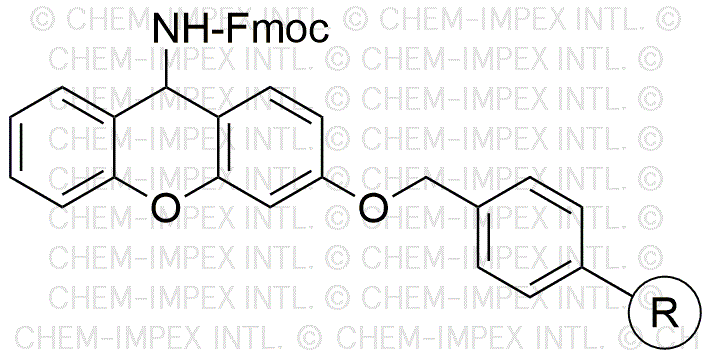9-Fmoc-aminoxanthen-3-yloxy-polystyrene resin is widely utilized in research focused on:
- Peptide Synthesis: This resin serves as a solid support for the synthesis of peptides, allowing for efficient coupling and deprotection steps in solid-phase peptide synthesis (SPPS).
- Drug Development: It is used in the development of pharmaceutical compounds, particularly in the creation of peptide-based drugs, enhancing the efficiency of drug discovery processes.
- Bioconjugation: The resin facilitates bioconjugation reactions, enabling researchers to attach biomolecules to surfaces or other molecules, which is essential in creating targeted therapies.
- High-Throughput Screening: Its properties make it suitable for high-throughput screening applications, allowing researchers to quickly evaluate multiple compounds for biological activity.
- Custom Polymer Synthesis: The resin can be tailored for specific applications, providing flexibility in creating custom polymers for various industrial applications, such as sensors or drug delivery systems.
Informations générales
Propriétés
Sécurité et réglementation
Applications
9-Fmoc-aminoxanthen-3-yloxy-polystyrene resin is widely utilized in research focused on:
- Peptide Synthesis: This resin serves as a solid support for the synthesis of peptides, allowing for efficient coupling and deprotection steps in solid-phase peptide synthesis (SPPS).
- Drug Development: It is used in the development of pharmaceutical compounds, particularly in the creation of peptide-based drugs, enhancing the efficiency of drug discovery processes.
- Bioconjugation: The resin facilitates bioconjugation reactions, enabling researchers to attach biomolecules to surfaces or other molecules, which is essential in creating targeted therapies.
- High-Throughput Screening: Its properties make it suitable for high-throughput screening applications, allowing researchers to quickly evaluate multiple compounds for biological activity.
- Custom Polymer Synthesis: The resin can be tailored for specific applications, providing flexibility in creating custom polymers for various industrial applications, such as sensors or drug delivery systems.
Documents
Fiches de données de sécurité (FDS)
La FDS fournit des informations de sécurité complètes sur la manipulation, le stockage et l’élimination du produit.
Spécifications du produit (PS)
Le PS fournit une description complète des propriétés du produit, notamment sa composition chimique, son état physique, sa pureté et les exigences de stockage. Il détaille également les plages de qualité acceptables et les applications prévues du produit.
Certificats d'analyse (COA)
Recherchez des certificats d'analyse (COA) en saisissant le numéro de lot du produit. Les numéros de lot et de lot se trouvent sur l'étiquette d'un produit, après les mots « Lot » ou « Lot de fabrication ».
Numéro de catalogue
Numéro de lot/série
Certificats d'origine (COO)
Ce certificat d'exploitation confirme le pays dans lequel le produit a été fabriqué, et détaille également les matériaux et composants utilisés et s'il est issu de sources naturelles, synthétiques ou autres sources spécifiques. Ce certificat peut être requis pour les douanes, le commerce et la conformité réglementaire.
Numéro de catalogue
Numéro de lot/série
Fiches de données de sécurité (FDS)
La FDS fournit des informations de sécurité complètes sur la manipulation, le stockage et l’élimination du produit.
DownloadSpécifications du produit (PS)
Le PS fournit une description complète des propriétés du produit, notamment sa composition chimique, son état physique, sa pureté et les exigences de stockage. Il détaille également les plages de qualité acceptables et les applications prévues du produit.
DownloadCertificats d'analyse (COA)
Recherchez des certificats d'analyse (COA) en saisissant le numéro de lot du produit. Les numéros de lot et de lot se trouvent sur l'étiquette d'un produit, après les mots « Lot » ou « Lot de fabrication ».
Numéro de catalogue
Numéro de lot/série
Certificats d'origine (COO)
Ce certificat d'exploitation confirme le pays dans lequel le produit a été fabriqué, et détaille également les matériaux et composants utilisés et s'il est issu de sources naturelles, synthétiques ou autres sources spécifiques. Ce certificat peut être requis pour les douanes, le commerce et la conformité réglementaire.


